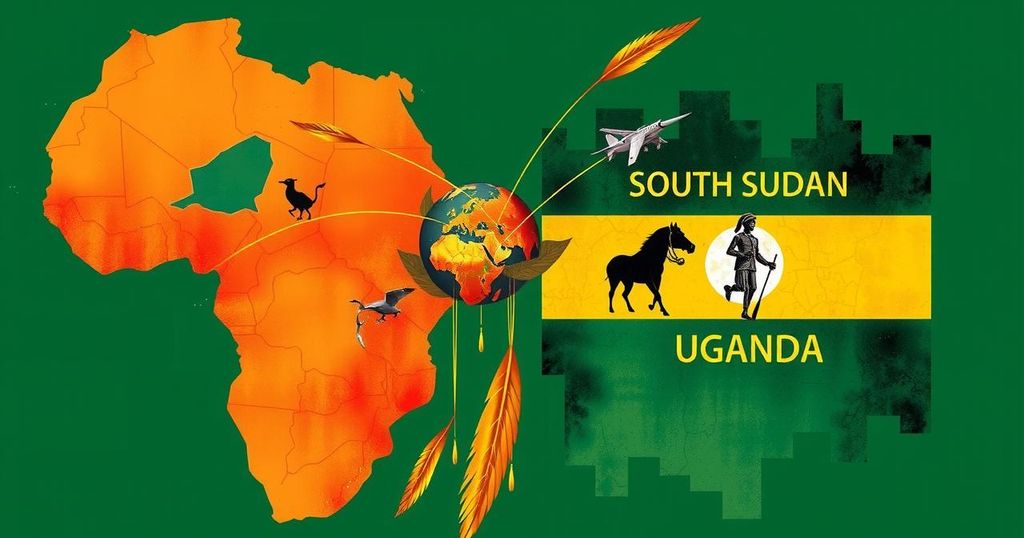Navigating Bilateral Dynamics: South Sudan and Uganda’s Complex Relationship

South Sudan’s evolving relationship with Uganda reflects historical ties and contemporary tensions that influence both local governance and regional stability. Uganda’s military support and economic involvement present challenges, including accusations of bias and political interference. Moving forward, South Sudan must formulate a strategic diplomatic approach that balances its dependencies while safeguarding its sovereignty and addressing internal governance challenges to promote stability and peace.
South Sudan, the world’s youngest nation, stands at a crucial juncture in its relationship with Uganda. Deep-rooted historical links and differing political agendas play a significant role in shaping the bilateral dynamics, which, in turn, impact regional stability and economic development. As South Sudan navigates these complexities, it faces challenges that could influence its path forward.
Since gaining independence on July 9, 2011, Uganda has been a pivotal ally for South Sudan, offering military and logistical support throughout its protracted struggle for self-determination. Under President Yoweri Museveni’s leadership, the Ugandan military aided the Sudan People’s Liberation Army (SPLA) in its battles against the Sudanese government, often framed as efforts to combat the Lord’s Resistance Army (LRA). However, the aftermath of this support has revealed numerous complexities.
The relationship between Uganda and South Sudan has oscillated between cooperation and competition. South Sudan has become a significant market for Ugandan goods and labor, while Uganda has facilitated crucial trade flows, helping to bolster South Sudan’s economy. Furthermore, Uganda has taken an active role in fostering peace initiatives through regional platforms such as the Intergovernmental Authority on Development (IGAD), thus underscoring its importance as a partner in stability.
Nevertheless, the dynamics between both nations have been fraught with tension. Uganda’s military intervention during South Sudan’s civil conflict, particularly beginning in December 2013, has created deep rifts. Deployments of the Ugandan People’s Defense Force (UPDF) to support President Salva Kiir exacerbated existing tensions and led to significant humanitarian crises, displacing many individuals and causing destruction in several regions.
While the peace agreement of 2018 marked an official end to conflict, South Sudan continues to struggle with divided governance structures and a deepening humanitarian emergency. Consequently, bilateral relations with Uganda have evolved beyond mere friendship or rivalry to encompass broader geopolitical implications, notably concerning conflicts in neighboring nations such as the Democratic Republic of Congo and Somalia.
Uganda’s backing of President Kiir has sparked allegations of partiality from opposition factions aligned with Riek Machar. Such interventions have selected South Sudan as a player in a complex regional power dynamic, with external actors like Sudan and Ethiopia vying for influence.
Economic contests between the two nations are equally noteworthy. The shared border is vital for trade and energy supply, with Uganda developing infrastructure that may link South Sudan’s oil reserves to its markets. This economic competition may heighten tensions as both nations aim to assert their interests and benefit from natural resources.
Uganda’s strategic interests in South Sudan’s oil sector have not gone unnoticed on the international stage, prompting scrutiny of its investments amidst ongoing instability. Moving forward, it is essential for both countries to engage in diplomacy that safeguards their mutual interests, averting potential conflicts over resources.
Situated in the Horn of Africa, South Sudan presents significant opportunities for global powers interested in its abundant natural resources. Relations with neighboring Sudan, Ethiopia, and Kenya further complicate its foreign policy landscape, which is increasingly influenced by the competitive interests of external actors, including major powers like the U.S., China, and Russia.
As one of East Africa’s most influential nations, Uganda seeks stability in South Sudan, both for its own security and to maintain its regional supremacy. However, its close relationship with Kiir’s administration has earned it criticism from neighboring countries and raised alarm regarding Uganda’s role in exacerbating South Sudan’s internal fissures.
Regional and international organizations, notably the United Nations and the African Union, continue to shape Uganda’s engagements, urging a more neutral position in South Sudan to facilitate dialogue across competing factions.
To ensure a stable future, South Sudan must articulate a diplomatic strategy that balances its economic reliance on Uganda with its sovereignty. It is crucial for South Sudan’s leadership to foster relations with other regional powers such as Ethiopia and Kenya while addressing its internal governance issues, thereby minimizing vulnerabilities to foreign meddling.
Ultimately, establishing effective governance and fostering national unity will enable South Sudan to resist the pressures of external influences. The pursuit of genuine peace and inclusive policies will be vital for the country’s resilience in the face of regional challenges.
In summary, South Sudan finds itself in a precarious yet pivotal relationship with Uganda, marked by both historical support and contemporary challenges. The implications of Uganda’s involvement in South Sudan extend beyond immediate political alliances, influencing regional stability and economic viability. As South Sudan navigates this landscape, it is imperative that the government adopts a diplomatic approach that prioritizes sovereignty, strengthens governance, and diversifies partnerships. Only through these measures can South Sudan hope to mitigate external influences and promote lasting peace.
Original Source: www.radiotamazuj.org








